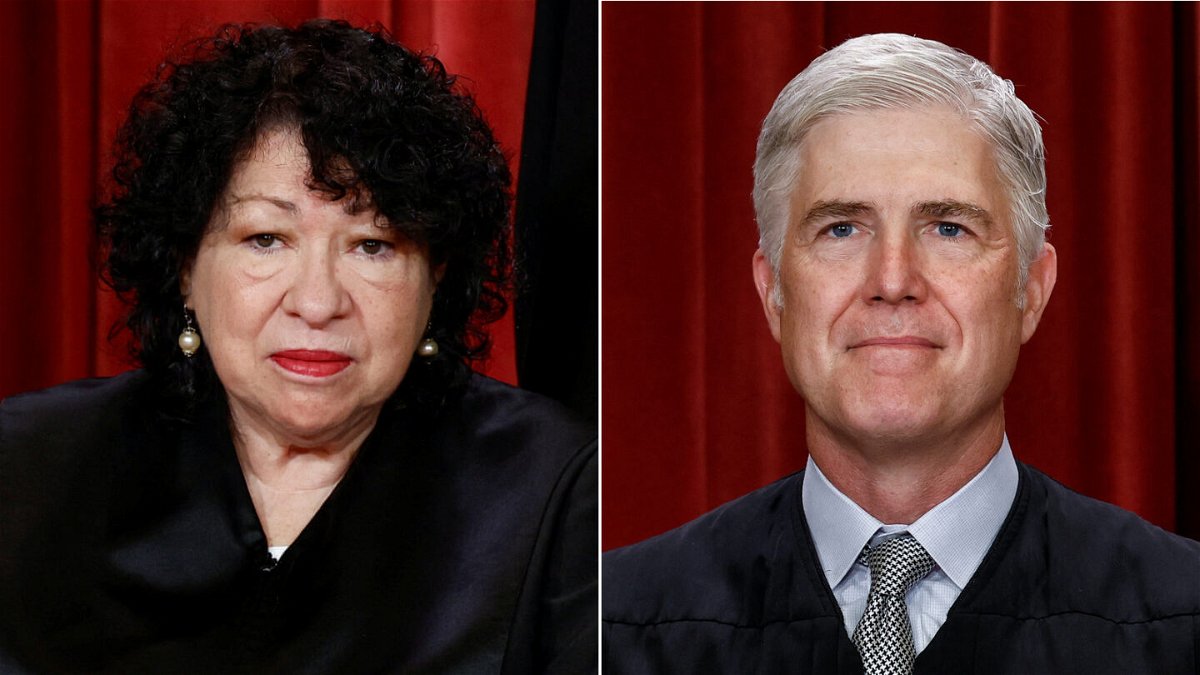2 Supreme Court justices did not recuse themselves in cases involving their book publisher

U.S. Supreme Court Justices Sonia Sotomayor and Neil Gorsuch.
By Devan Cole, CNN
Two Supreme Court justices did not recuse themselves from cases that came before the court over the past decade involving a publishing company that’s paid them in lucrative book deals.
In two separate copyright infringement cases concerning the publishing conglomerate Penguin Random House, the high court declined to take up the appeals, with the court saying in 2013 that it wouldn’t hear the first case, and the second case being turned away from the court in 2019 and again in 2020. In both cases, the publisher won at the lower court level, and those decisions stood.
Liberal Justice Sonia Sotomayor, who joined the court in 2009 and has been paid millions of dollars from the publisher over the years, declined to recuse herself in all three instances.
Conservative Justice Neil Gorsuch, who joined the court in 2017 and also has received hundreds of thousands of dollars in book deals with the publisher, declined to disqualify himself from the more recent case when it came before the court for consideration.
The justices’ actions were earlier reported by Fix the Court, a watchdog group that presses for more transparency from the judiciary, and The Daily Wire.
The Supreme Court has come under intense scrutiny in recent weeks following a series of reports on ethical lapses among some justices related to a lack of transparency around their financial disclosures. Watchdog groups have been especially focused on the court’s recusal practices, an area they say is ripe for reform given that no mechanism exists for ensuring a justice won’t participate in a case in which they might have a conflict.
The Supreme Court did not respond for comment.
The court does not typically say publicly how a justice voted in a decision over whether to take up an appeal, but it does briefly note when a recusal has occurred.
In both cases, former liberal Justice Stephen Breyer, who also has received book royalties from the publisher, recused himself.
Gabe Roth, executive director of Fix the Court, told CNN that the federal law concerning recusal has long been interpreted as applying to stock ownership on the part of the justice or a close family member.
Roth said that Breyer, who retired in 2022, likely recused himself from the cases because he owns stock in a company that for a time had a large stake in Penguin.
For her part, Sotomayor, who is currently the court’s senior liberal, has published several books since joining the bench, including a few children’s books and a memoir, “My Beloved World,” which was published in 2013 by Knopf Doubleday Publishing Group. The group is part of the publishing conglomerate Penguin Random House.
In financial disclosure forms for 2010 and 2012, Sotomayor reported receiving book advances from Knopf Doubleday that totaled $3.1 million. Her disclosure forms for the years 2017 through 2021 show that the company has paid her nearly $500,000 in book royalties and advances during that period. The disclosures for 2022 are not yet available.
Gorsuch published “A Republic, If You Can Keep It” in 2019 through Penguin. The justice has received a total of $655,000 from the publishing conglomerate in recent years, according to his 2018, 2019 and 2020 disclosures.
Roth, whose group has for years kept track of instances in which justices should have recused themselves from a case, said he could not point to other examples where a justice should have disqualified him or herself from a case concerning their book publisher.
Roth noted that Justices Amy Coney Barrett and Ketanji Brown Jackson also have books in the works.
“I think these entities should be added to the justices’ recusal sheets, and they should not participate in petitions involving their book publishers that are very clearly enriching them,” Roth said.
When it comes to recusals, the standards for recusal at the high court are necessarily more restrictive because the Supreme Court allows only its own members to hear a dispute — unlike the lower courts that can freely substitute one district or circuit court judge for another.
In a statement last month by all nine current members of the court that they said was meant to provide “clarity” to the public their ethics practices, the justices explained why individual jurists “rather than the Court” must decide recusal issues.
“If the full Court or any subset of the Court were to review the recusal decisions of individual Justices, it would create an undesirable situation in which the Court could affect the outcome of a case by selecting who among its Members may participate,” they said in the statement.
The-CNN-Wire
™ & © 2023 Cable News Network, Inc., a Warner Bros. Discovery Company. All rights reserved.
CNN’s Joan Biskupic and Ariane de Vogue contributed to this report.